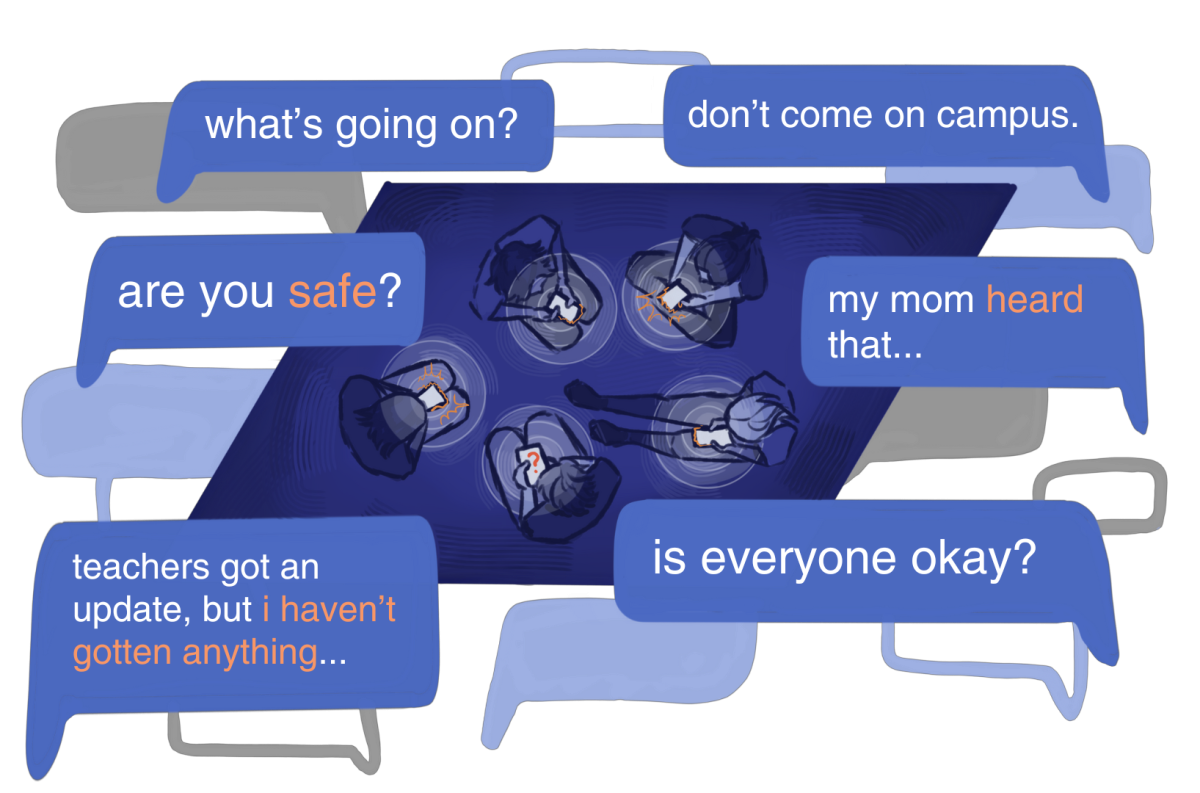Students crouched on the floor as they waited in silence during the lockdown on Sept. 13 without knowing the events taking place beyond the classroom walls. At 3:25 p.m., the public address (PA) system alerted those on campus to initiate lockdown procedures. Immediately, students and teachers locked doors and turned off lights to comply with procedure. During the 30 minutes of shelter-in-place, which the school later classified as a false alarm, students received no information or updates about the incident.
Teachers received a notification from Assistant Head of School Ken Allen at 3:40 p.m. first notifying them of the lockdown. Afterwards, Head of School Brian Yager gave updates every five minutes, informing faculty of the arrival of police cars and telling them to continue locking down. In total, faculty received nine emails on Sept. 13 about the lockdown.
The Harker emergency alert system sent parents alerts which indicated the start and the end of the lockdown and students on-campus received the same information through the PA system. Students who were off-campus did not receive any firsthand communication about the lockdown, which could have created unsafe conditions for those returning to campus during the event.
Critical information about campus lockdowns should circulate to everyone impacted by the lockdown, not just teachers. Leaving students out of the circle of communication means leaving them entirely in the dark during a potential life or death situation. This policy allows secondhand rumors to spread among the student body and parent chats unchecked. The emails that teachers received contained information that would have alleviated fears and reassured students.
A day after the lockdown, students received an email containing details on the situation from Head of Upper School Paul Barsky. He attached a message from Yager, which detailed how an “inadvertent prompt” caused our lockdown system to activate, and he affirmed that the school would continue to “make adjustments to the system.” Just one year earlier, on the exact same day, Sept. 13, students engaged in a lockdown for the same reason, and the school promised to make changes, “modifying the code to avoid this in the future.” Yet, since the same issue occurred, it seems as if the school has made minimal changes to their process.
A few days later, after the fire alarm during lunch on Sept. 19, administration gave no updates as to why the alarm rang, either after the drill concluded or in a later email. Without an accurate and transparent source of information, students received information from rumors. After every alert, students and parents should receive a response detailing how and why an event occurred.
In that fire drill, many students responded apathetically and debated whether the alarm was real or not. Instead of worrying about potential danger, many students bemoaned the loss of their coveted lunch time. No matter the situation, students should still respond appropriately to alerts. However, part of the issue arises from the lack of transparency around emergency response. Without detailed updates regarding why something occurred, many students will begin to distrust the emergency systems.
We need an update for our emergency responses, where we have a designated system to notify students immediately through email or text about an alarm. In addition, with these situations, the lack of transparency erodes the community’s trust in the emergency system. We should expect a better line of communication between administrators and students.


















![“[Building nerf blasters] became this outlet of creativity for me that hasn't been matched by anything else. The process [of] making a build complete to your desire is such a painstakingly difficult process, but I've had to learn from [the skills needed from] soldering to proper painting. There's so many different options for everything, if you think about it, it exists. The best part is [that] if it doesn't exist, you can build it yourself," Ishaan Parate said.](https://harkeraquila.com/wp-content/uploads/2022/08/DSC_8149-900x604.jpg)




![“When I came into high school, I was ready to be a follower. But DECA was a game changer for me. It helped me overcome my fear of public speaking, and it's played such a major role in who I've become today. To be able to successfully lead a chapter of 150 students, an officer team and be one of the upperclassmen I once really admired is something I'm [really] proud of,” Anvitha Tummala ('21) said.](https://harkeraquila.com/wp-content/uploads/2021/07/Screen-Shot-2021-07-25-at-9.50.05-AM-900x594.png)







![“I think getting up in the morning and having a sense of purpose [is exciting]. I think without a certain amount of drive, life is kind of obsolete and mundane, and I think having that every single day is what makes each day unique and kind of makes life exciting,” Neymika Jain (12) said.](https://harkeraquila.com/wp-content/uploads/2017/06/Screen-Shot-2017-06-03-at-4.54.16-PM.png)








![“My slogan is ‘slow feet, don’t eat, and I’m hungry.’ You need to run fast to get where you are–you aren't going to get those championships if you aren't fast,” Angel Cervantes (12) said. “I want to do well in school on my tests and in track and win championships for my team. I live by that, [and] I can do that anywhere: in the classroom or on the field.”](https://harkeraquila.com/wp-content/uploads/2018/06/DSC5146-900x601.jpg)
![“[Volleyball has] taught me how to fall correctly, and another thing it taught is that you don’t have to be the best at something to be good at it. If you just hit the ball in a smart way, then it still scores points and you’re good at it. You could be a background player and still make a much bigger impact on the team than you would think,” Anya Gert (’20) said.](https://harkeraquila.com/wp-content/uploads/2020/06/AnnaGert_JinTuan_HoHPhotoEdited-600x900.jpeg)

![“I'm not nearly there yet, but [my confidence has] definitely been getting better since I was pretty shy and timid coming into Harker my freshman year. I know that there's a lot of people that are really confident in what they do, and I really admire them. Everyone's so driven and that has really pushed me to kind of try to find my own place in high school and be more confident,” Alyssa Huang (’20) said.](https://harkeraquila.com/wp-content/uploads/2020/06/AlyssaHuang_EmilyChen_HoHPhoto-900x749.jpeg)




